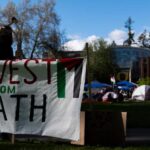By Dan Butcher
eFinancial Careers, November30, 2017 —

Getty Images
It’s hard enough to break into Wall Street when you have all the right connections and an elite education. Imagine trying to become an investment banker when you’re from the wrong side of the tracks. Banking has always been an elitist industry that favors more well-heeled candidates, even if there’s the odd exception.
Case in point is Goldman Sachs chairman and CEO Lloyd Blankfein, who was born in the Bronx and grew up in a New York City Housing Authority project in the East New York section of Brooklyn. His father was a U.S. Postal Service clerk and his mother was a receptionist.
Wall Street is slowly recognising the need to hire from a more diverse range of candidates beyond its typical white-shoe targets. It is possible to get in from a poorer background. Here’s how.
A proliferation of programs
Many banks have programs specifically dedicated to recruiting candidates from all different backgrounds. There are also independent not-for-profit organizations.
Michael Osheowitz started out in investment banking and later became president of financial consulting firm Arthur Schmidt & Associates. He founded Sponsors for Educational Opportunity (SEO), educational, career training and professional development programs for high school and college students of color. Its investment banking program alone operates in New York, London, Hong Kong, Beijing and Shanghai, and more than 75% of its 5,000-plus graduates have received full-time job offers from major financial services firms.

Carla Harris
Carla Harris is vice chairman, managing director and the head of the multicultural client strategy group at Morgan Stanley, making her one of the highest-ranking African-American women on Wall Street. She spearheads the Multicultural Innovation Lab, which launched in July, and touts SEO from personal experience.
“I am a product of that organization,” Harris says. “SEO provides 40-to-60 extra hours of extra educational enrichment during their high school years to help them get higher SAT scores and get into better colleges, which are a better access point to get noticed for interviews at Wal Street firms.
“If you’re from a disadvantaged background but you have an opportunity to go to a better school that these banks recruit from, then you might get the interview and perhaps even get the job,” she says.
“The key is getting into one of the schools on the investment banks’ radar, and getting into one of these programs really helps so you know how to conduct yourself in an interview once you get into that recruitment pipeline.” – Carla Harris
Non-profit organization A Better Chance runs the College Preparatory Schools Program (CPSP), which recruits, refers and supports about 500 scholars of color annually at more than 300 prestigious boarding, day and public schools across the U.S.
“A Better Chance is a 60-year-old organization that takes talented kids of color out of tough economic environments and puts them in some of the best boarding schools in the country and helps them get into the best colleges and universities in the country,” Harris says.
“The ability to get a job on Wall Street has a lot to do with your access point – for the almost 40 years of these [investment banking] analyst programs, most Wall Street firms have gone to the best schools in the country like Ivy League, NYU and the University of Chicago to recruit from,” she says.
The right connections
Students from socioeconomically disadvantaged backgrounds don’t have the help or the social circle that someone from a middle-class or upper-class family does.
Students from more privileged backgrounds often take for granted their ability to get in touch with friends and family to learn about the financial services industry and hear about various career opportunities, according to Christine Li-Auyeung, a senior vice president at StoneCastle Partners, an asset management firm dedicated to the U.S. banking sector. She is the founder and director of the Financial Leadership Program (FLP, formerly the Wall Street Careers Program) at the City University of New York’s Baruch College Starr Career Development Center.
Christine Li-Auyeung
“They may be the first person in their family who went to college and pursued a professional career, so they’re not surrounded by professionals,” Li-Auyeung says.
“They need mentors to guide them along the way and figure out what opportunities are out there, as well as basic skills such as writing and editing resumes and cover letters, interview prep and discussing topics about the industry so they understand the opportunities and trends.” – Christine Li-Auyeung
“Another common knowledge gap is etiquette, including how to dress for an interview,” she says. “Regardless, don’t be discouraged, seek out mentors and opportunities because you never know what doors will open to you.”
The FLP is a non-credit two-semester program requiring a commitment from each student of approximately 15 hours per week. Most students work 20 hours per week and take four or five courses per semester.
Marietta Bottero, manager of the FLP at Baruch College and an ex-VP at BMO Capital Markets, says that FLP alumni who work in front-office positions on Wall Street have created a pathway to a financial services career for current Baruch students, giving them access to valuable professional connections.
The target career focus for this group is the capital markets arena of investment banking, credit and market risk management, managerial finance, bank regulation, equity research, quantitative analysis and sales/trading.
“The program helps them to achieve their career goal by providing intensive technical, soft-skills and career-development training,” Bottero says.
“This includes workshops, guest speakers, company visits, case competitions, resume writing, networking opportunities, mentoring, intensive technical skill training, personal pitches, leadership and success training, trading simulations and executive presence, including getting your shoes polished, the right shirt, tie, suit, shoes, briefcase, nail polish color, jewelry and shoes.”
John Hope Bryant
Aside from the skills you gain by attending one of these courses, they also help open doors, which is the key to landing a job on Wall Street, says John Hope Bryant, the founder, chairman and CEO of Operation Hope and the author of The Memo and How the Poor Can Save Capitalism: Rebuilding the Path to the Middle Class.
“Half of all success in life is relationship capital,” Bryant says. “Knowing the right people and getting those people to adopt, support, engage, lean in and endorse you and expanding your natural universe of those you know to include those you don’t.”











